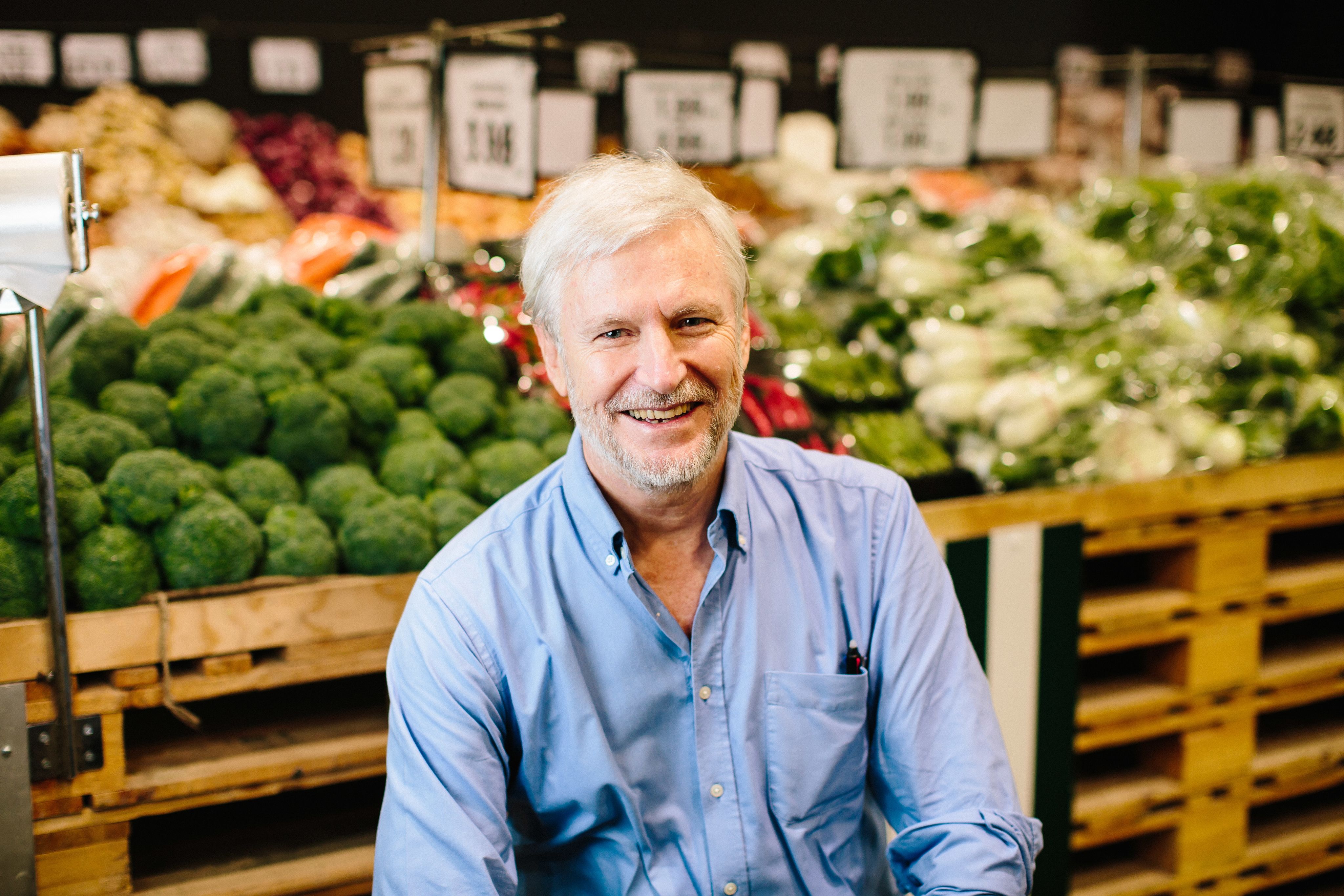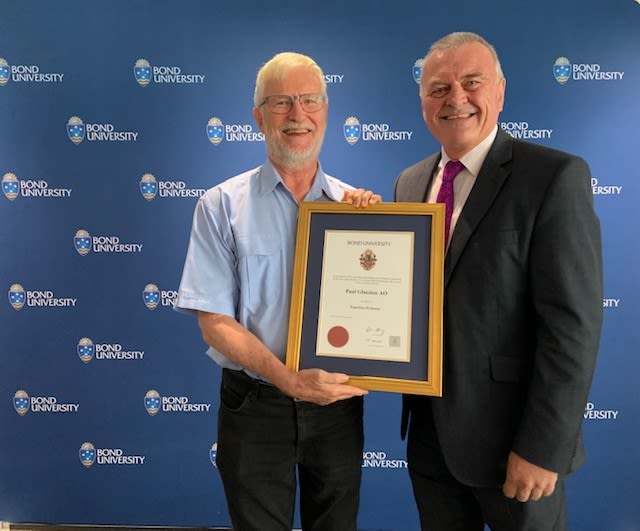

Bond University's new Emeritus Professor transformed modern medicine by championing smarter, evidence-based care—inspiring a new generation of researchers. He sat down with us to share how he did it.
From his earliest days at university, Professor Paul Glasziou found himself split between two worlds: mathematics and medicine. “To be honest, I was torn,” he recalls. “But in a way, I ended up doing both.” Nudged toward a medical degree by his parents — a decision he says he doesn’t regret — Paul pursued his passion for maths on the side, studying statistics, decision theory, and computer science. That dual curiosity would go on to shape an extraordinary career in clinical epidemiology and reimagine how research is translated into real-world health outcomes.
Now, honoured as an Emeritus Professor at Bond University, Paul reflects on the path that brought him here — one that’s been anything but linear, and all the richer for it.
Moments that matter
For someone with a mind wired for patterns, logic and systems, the early years of medical training felt, at times, frustratingly imprecise. Everything shifted when Paul picked up a book that would change the course of his career: Rational Diagnosis and Treatment by Danish gastroenterologist Henrik R. Wulff.
“It was an application of more rational, logical, epidemiological approaches to medicine — and it was not something I was taught at medical school,” Paul says.
While completing his PhD, he spent six months in Denmark and had the chance to meet Wulff in person. “It was a revelation.”
Later in his career, a workshop in Sydney brought Paul into contact with another influential figure: David Sackett, the founder of evidence-based medicine and a leader in clinical epidemiology.
“Just meeting up with him and having some interesting conversations switched me on to the possibilities,” Paul reflects. “I visited him a few times in England while he was the Director of the Centre for Evidence-Based Medicine at the University of Oxford, a role I eventually took over when Dave returned to Canada.”

Professor Paul Glasziou being awarded Emeritus Professor with Vice-Chancellor and President of Bond University is Professor Tim Brailsford.
Professor Paul Glasziou being awarded Emeritus Professor with Vice-Chancellor and President of Bond University is Professor Tim Brailsford.
Moments that matter
For someone with a mind wired for patterns, logic and systems, the early years of medical training felt, at times, frustratingly imprecise. Everything shifted when Paul picked up a book that would change the course of his career: Rational Diagnosis and Treatment by Danish gastroenterologist Henrik R. Wulff.
“It was an application of more rational, logical, epidemiological approaches to medicine — and it was not something I was taught at medical school,” Paul says.
While completing his PhD, he spent six months in Denmark and had the chance to meet Wulff in person. “It was a revelation.”
Later in his career, a workshop in Sydney brought Paul into contact with another influential figure: David Sackett, the founder of evidence-based medicine and a leader in clinical epidemiology.
“Just meeting up with him and having some interesting conversations switched me on to the possibilities,” Paul reflects. “I visited him a few times in England while he was the Director of the Centre for Evidence-Based Medicine at the University of Oxford, a role I eventually took over when Dave returned to Canada.”
Career-defining projects
As a general practitioner (GP), Paul often found himself frustrated by the lack of reliable resources for non-drug therapies. While pharmaceutical interventions had long been catalogued and formalised, no equivalent existed for treatments like exercise, dietary changes, or behavioural interventions.
“It had been a dream of mine as a GP to establish a compendium of evidence-based, non-drug interventions,” he explains. That dream became reality with the creation, alongside the Royal Australian College of General Practitioners, of the Handbook of Non-Drug Interventions (HANDI) — a world-first database developed more than a decade ago that continues to influence practice. “We’ve had pharmacopoeias of what drugs work for hundreds of years, but not of non-drug therapy. So HANDI is something that will continue forever.”
Equally significant — and arguably just as enduring — is Paul’s contribution to improving the quality and integrity of health research itself. Alongside colleague Sir Iain Chalmers, he co-authored Avoidable Waste in the Production and Reporting of Research Evidence, estimating that up to 85% of medical research may be wasted due to preventable issues like poor study design, unnecessary duplication, and non-publication of results.
“It’s avoidable, that’s why it was important,” Paul says. “There are ways we could reduce the loss in the research process… a lot of which are readily fixable.” Their findings laid the foundation for the global Ensuring Value in Research (EViR) forum, which brings together more than 60 international research funding organisations to tackle these challenges head-on.
Bridging two worlds
Working across research and general practice created a constant feedback loop for Paul. “Sitting in the clinic, I would think: ‘How can I get the answers I need?’. Because there are millions of papers. How do I find the one piece of research needed to get an answer?”
To make those moments count, Paul kept a small notebook by his side. “Keeping that logbook of questions by my side was helpful to know what sorts of questions I asked and what needed to be answered.”
In the research setting, he kept the same lens. “When I was over in my research office, I thought: ‘Okay, that’s interesting theoretically — but how would I be using this in practice?’. It was a two-way process of always examining how each connected with the other. And each needed to change.
“We talk about the multidisciplinary team — that’s very important because most modern problems require efforts from a range of people to answer them. The individual who does the research and clinical practice is their own multidisciplinary team — because they work actively in both. And so, they’re much stronger connectors.”
A life of questioning
Official titles might shift, but Paul’s drive to pursue meaningful work hasn’t wavered.
“It’s important for me to have that ongoing association with Bond University because I don’t expect to stop doing anything,” he says of being awarded the title Emeritus Professor.
“For example, I wrote The Differences And Overlaps Between ‘Explanatory’ And ‘Pragmatic’ Controlled Trials: A Historical Perspective in 2023 and my two co-authors were Ian Chalmers, aged 81, and Peter Armitage, the statistician, aged 99. Good academics can go on for a long time.”
Now free from day-to-day administration, Paul is directing his focus toward three key areas. “The first is, I want to internationalise HANDI,” he says. “It’s now widely used here in Australia but I want to push it further.
“The second focus is developing international rules to define what is a disease and what isn’t — and what the threshold should be. This is essential to combat over-diagnosis.”
His third area of focus is improving the efficiency and quality of research through appropriate automation. “With ten years of work, we have reduced what used to take two years to do a systematic review, down to two weeks,” Paul explains.
“We can keep getting that even better, improving quality at the same time as improving speed, across many areas of medical research to reduce avoidable waste.
“I want to see automation tools that do the right things. That helps people do research better, faster, and to higher quality.”

Looking ahead
As he moves into a new phase, Paul’s approach remains the same — ask good questions and find better ways to answer them.
He still has the same curiosity that once had him scribbling clinical questions into a notebook during clinic consultations. And when the questions grow complex, he has someone he trusts to help find the way forward.
“My wife, Nancy, is my sounding board for most things,” Paul says. “Particularly the big-picture things, I’ll always talk to her. She’s a very, very wise woman and takes the long-term into account. So, she gives me good advice.”
It’s clear that Paul’s work isn’t winding down, it’s evolving. And with clarity of purpose, enduring partnerships, and a lifelong commitment to improving practice, his next chapter promises to be as impactful as the last.
Published on Wednesday, 23 April, 2025.
Original thinking direct to your inbox

Stories from Bond


